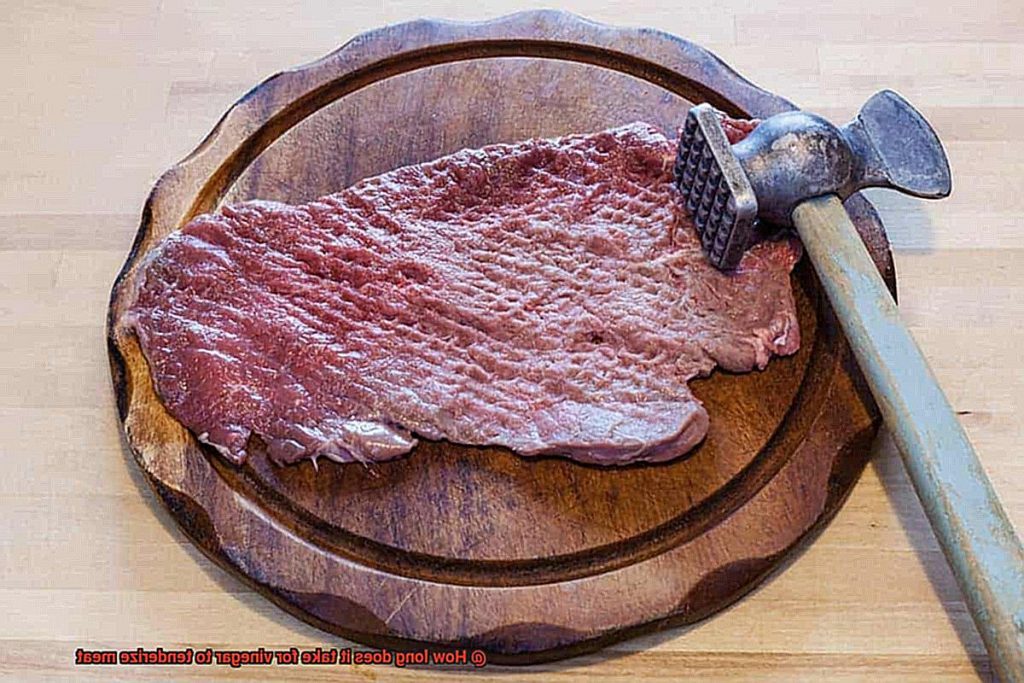Have you ever had a hankering for a juicy steak or tender chicken, only to be disappointed by tough and chewy meat? It’s enough to make any foodie frustrated. But don’t throw in the towel just yet, because vinegar might just be the secret ingredient you need to tenderize your meat.
For generations, chefs and home cooks alike have turned to vinegar as a trusty meat tenderizer. And it’s no wonder why – vinegar contains acetic acid that can break down the tough fibers in meat, making it easier to chew and enjoy. But the question remains: how long does it take for vinegar to work its magic?
Well, there’s no one-size-fits-all answer. The cut of meat and cooking method can affect how long it takes for vinegar to tenderize your dish. For instance, a tougher cut like brisket may need several hours of soaking in vinegar or even an overnight marinade before cooking. On the other hand, a more delicate cut like fish might only require a quick dip in some vinegar before hitting the pan.
But fear not. With a few tips and tricks up your sleeve, you’ll be able to use vinegar as a reliable meat tenderizer time and time again. Whether you choose to soak your meat or incorporate vinegar into your marinade, there are plenty of ways to achieve that succulent texture you’ve been dreaming of.
So if you’re ready to take your culinary game up a notch with some tenderized meat goodness, keep reading. We’ll dive into all the details on how long it takes for vinegar to do its thing and transform your dish from tough to tantalizing.
Contents
What is Vinegar?
At its core, vinegar is made by fermenting alcohol-containing liquids with acetic acid bacteria. This process converts the alcohol into acetic acid, giving vinegar its signature sour taste and pungent odor. There are many types of vinegar available, each with its unique flavor profile and uses. Some of the most common types of vinegar include white vinegar, apple cider vinegar, red wine vinegar, and balsamic vinegar.
One of the main reasons why vinegar is so widely used in cooking is due to its ability to tenderize meat. The acidic properties of vinegar break down the tough fibers in meat, making it more tender and easier to chew. However, the amount of time it takes for vinegar to tenderize meat depends on several factors including the type of meat and cut, as well as the cooking method being used.
For tougher cuts of meat like beef brisket or pork shoulder, marinating in vinegar overnight can make a substantial difference in tenderness. However, for more tender cuts of meat like steak or chicken breast, just a few hours of marinating in vinegar can be enough to make a noticeable difference.
In addition to its culinary uses, vinegar has several health benefits that have been known for centuries. It helps aid in digestion, lower blood sugar levels, and even promote weight loss. However, it’s essential to note that excessive consumption of vinegar can also lead to negative health effects such as tooth erosion and throat irritation.
When it comes to choosing the right type of vinegar for your dish, the possibilities are endless. While white vinegar is a popular choice for tenderizing meat, other types such as apple cider vinegar or balsamic vinegar can add different flavors to your dishes. Vinegar can also be used for cleaning and as a natural remedy for certain ailments.
Types of Vinegar for Tenderizing Meat
The answer is simple: vinegar. But not just any vinegar will do. There are many types of vinegar that can be used to tenderize meat, each with its own unique properties and flavors.
Let’s start with apple cider vinegar. This mild, slightly sweet vinegar is a popular choice for tenderizing tougher cuts of meat like beef or pork. It contains natural enzymes that break down the tough muscle fibers in the meat, making it more tender and easier to chew. Additionally, it adds a subtle sweetness that complements the natural flavors of the meat, creating a mouthwatering taste.
If you want to add depth and richness to your meat dishes, try using balsamic vinegar. This dark, complex vinegar has a sweet and tangy flavor that can elevate any dish. Its high acidity also helps break down connective tissue in the meat, making it more tender. Balsamic vinegar is excellent for marinating chicken or steak, as it adds a unique flavor profile that pairs well with these meats.
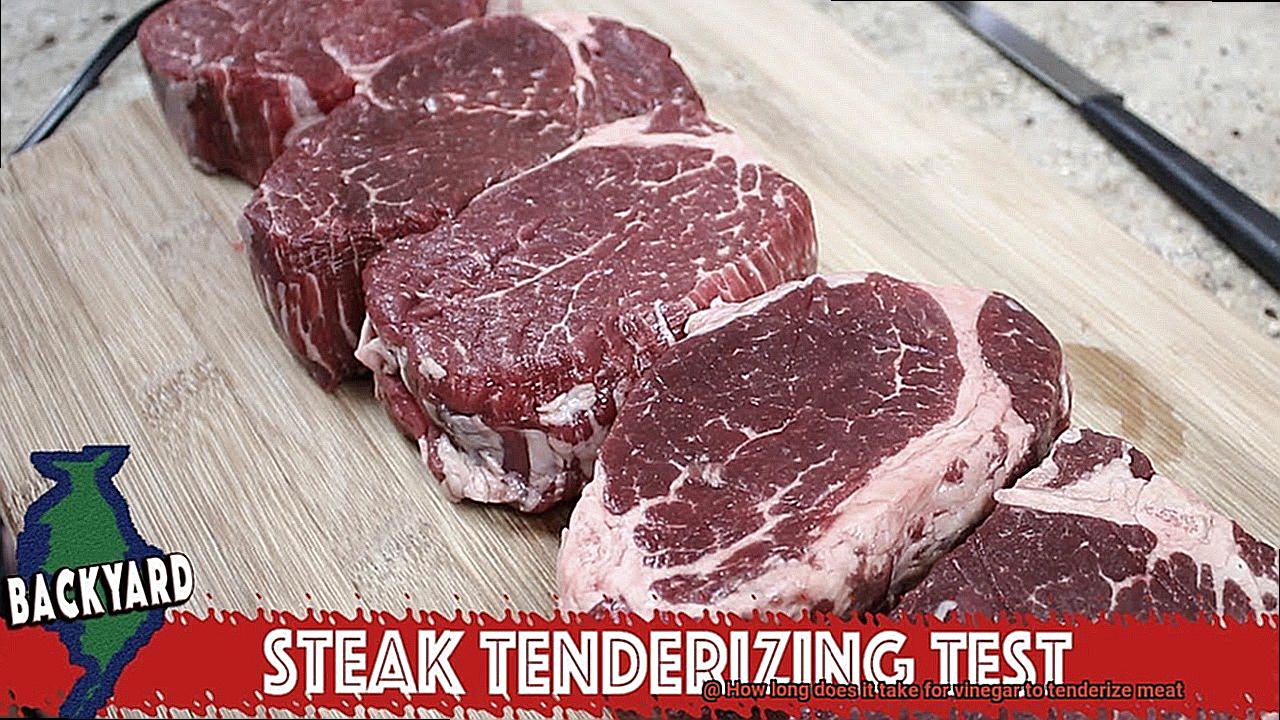
For a lighter, crisper flavor, white wine vinegar is the way to go. This mild vinegar has a slightly sour taste that pairs well with many different types of meat. It’s particularly effective at tenderizing chicken and fish, which can be more delicate than other types of meat. The acidity in white wine vinegar helps to break down the muscle fibers in the meat while adding a subtle tanginess that enhances its natural flavors.
Finally, rice vinegar can be used for tenderizing beef or pork, as well as for adding flavor to marinades and sauces. This mild, slightly sweet vinegar is made from fermented rice and has a very subtle flavor that won’t overpower the taste of your meat. It’s perfect for those who want to add a hint of sweetness without overpowering their dish.
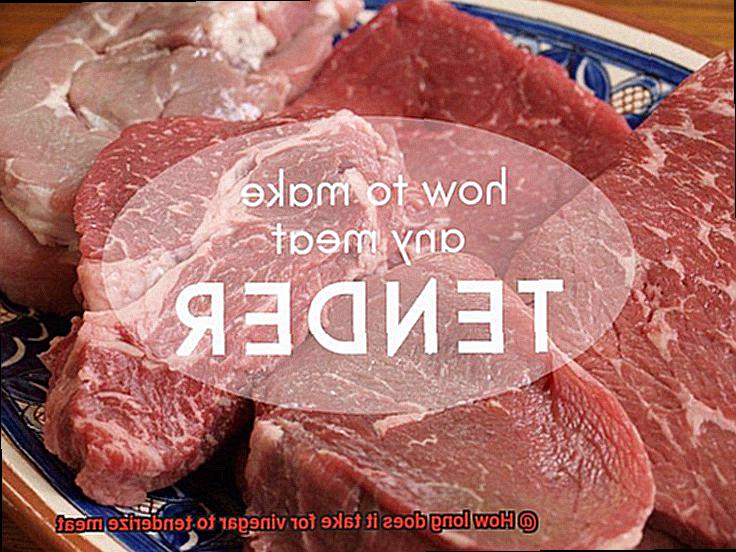
It’s important to remember that different cuts of meat may require different amounts of time to tenderize fully. Tougher cuts like beef brisket or pork shoulder may require several hours or even overnight to fully tenderize, while more delicate cuts like chicken breast or fish fillets may only need 30 minutes to an hour. Experimenting with different types and amounts of vinegar can lead to delicious and tender meat dishes that everyone will love.
How Long Does it Take for Vinegar to Tenderize Different Cuts of Meat?
Vinegar is the secret ingredient to tenderize your cuts of meat. However, it’s important to know how long it takes for this magic elixir to work its wonders on different cuts of meat.
One crucial factor that determines the marinating time is the type of meat. Tougher cuts such as beef chuck or pork shoulder require a longer marinating time compared to leaner cuts like chicken breast or pork tenderloin. For tougher cuts, marinating for at least 4-6 hours or overnight is recommended. This allows the vinegar to penetrate deep into the meat fibers and dissolve the tough connective tissues, resulting in a succulent and flavorful end product.
But be careful not to go overboard with leaner cuts. Over-marinating can lead to a mushy texture and an overpowering vinegar taste. A marinating time of 1-2 hours is sufficient to break down the proteins in leaner cuts.
It’s important to note that vinegar alone cannot guarantee perfect tenderness. Cooking techniques such as braising or slow-cooking are also necessary to achieve optimal results.
Benefits of Tenderizing Meat with Vinegar
Well, you might be surprised to know that a simple ingredient like vinegar can work wonders in tenderizing your meat. As an expert on the benefits of tenderizing meat with vinegar, let me tell you all about it.
First and foremost, using vinegar to tenderize meat can significantly reduce cooking time. The acetic acid in vinegar attacks the tough fibers in the meat, breaking them down and making it easier to cook through without sacrificing flavor or texture. This means you can spend less time in the kitchen and more time savoring your delicious, perfectly cooked meal.
But wait, there’s more. Tenderizing meat with vinegar can also enhance the flavor of your meat. When you marinate your meat in vinegar, the acid infuses the meat with a tangy flavor that can make even the toughest cuts taste extra delicious. This is especially useful for tougher cuts that may not have as much natural flavor.
And let’s not forget about digestion. Tenderizing meat with vinegar can make it more digestible by breaking down proteins in the meat. This is great news for anyone who has digestive issues or is simply trying to eat a healthier diet.
In fact, there are many benefits to tenderizing meat with vinegar. Here are a few more:
- Vinegar acts as a natural preservative, extending the shelf life of your meat.
- Marinating your meat in vinegar can also help to kill bacteria and other harmful pathogens.
- Using vinegar as a marinade can help to reduce the formation of harmful compounds during cooking, such as HCAs (heterocyclic amines) and PAHs (polycyclic aromatic hydrocarbons).
Tips for Marinating Meat with Vinegar
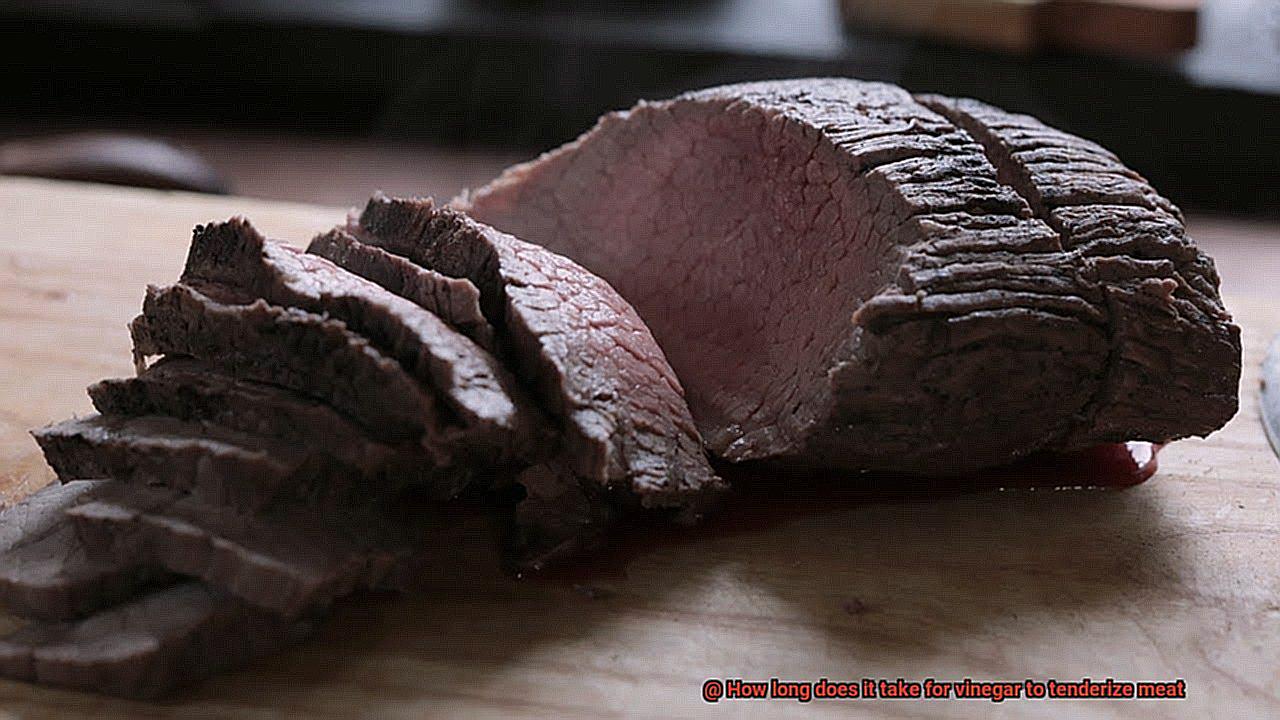
Marinating meat with vinegar is a tried and tested method for adding flavor and tenderness to your meats. But, how do you ensure that the process is effective? Here are six tips to make your vinegar marinade a success.
Tip 1: Choose the Right Type of Vinegar
The type of vinegar you use can make or break your marinade. For a mild flavor and just the right amount of acidity, choose apple cider vinegar or rice vinegar. Avoid balsamic vinegar, as it can be overpowering. Additionally, using a high-quality vinegar is important as cheaper options may contain additives that affect the taste of the meat.
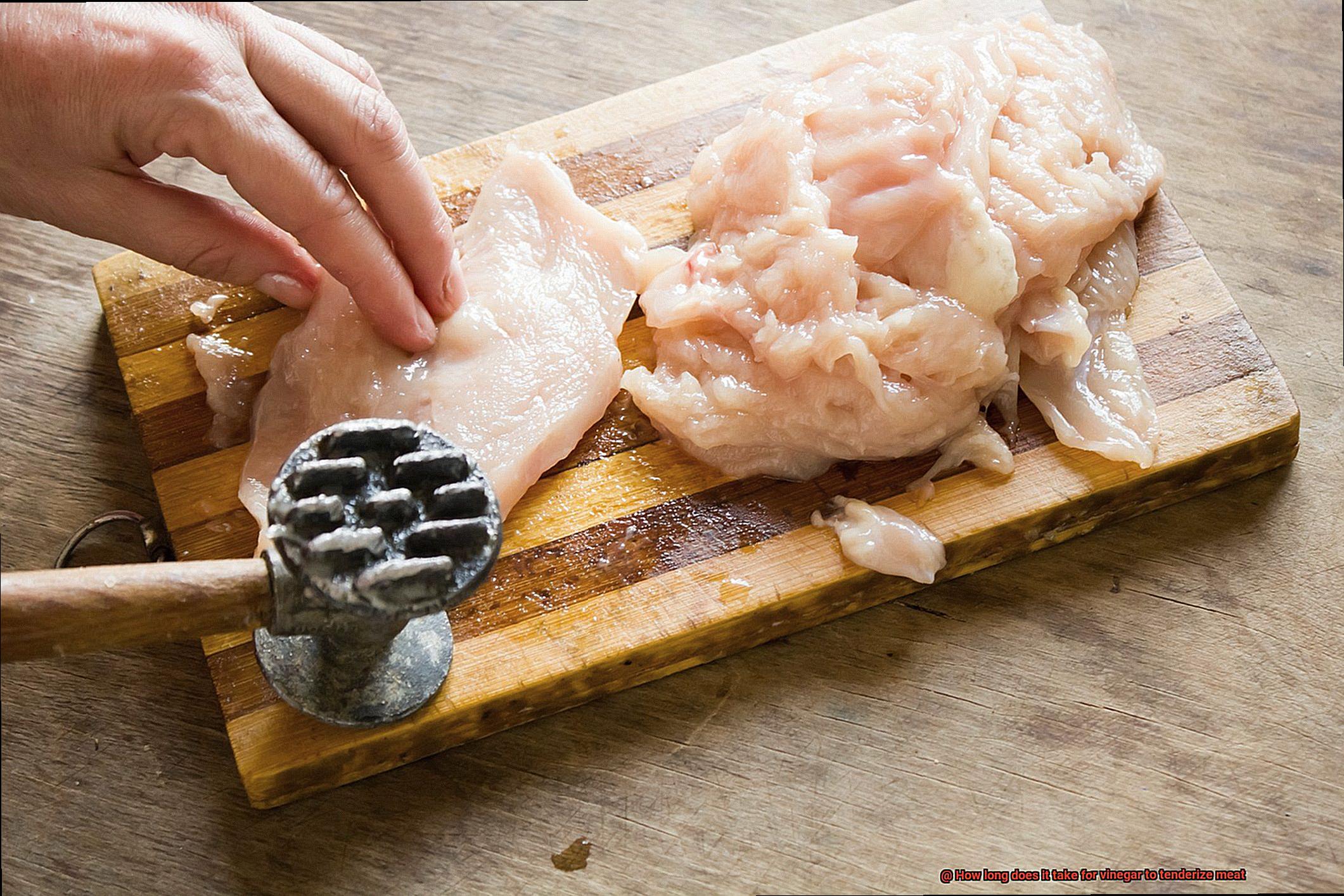
Tip 2: Marinate for the Appropriate Duration
The duration of the marination process is crucial in achieving the desired level of tenderness. For tougher cuts like beef or pork, it’s best to marinate for at least 4-6 hours or even overnight. However, thinner cuts like chicken breast or pork chops require only 30 minutes to an hour of marination. Over-marinating can ruin the texture of the meat, so it’s best to stick to a maximum of 24 hours.
Tip 3: Avoid Over-Marinating
While marinating for longer periods may sound like a good idea to achieve maximum tenderness, it’s not always the case. Over-marinating can lead to a mushy texture that won’t hold up well when cooked. It’s best to follow the recommended duration depending on your meat cut and thickness.
Tip 4: Use a Non-Reactive Container
When marinating meat with vinegar, avoid using metal containers as they can react with the acidic vinegar and give the meat a metallic taste. Instead, opt for non-reactive containers such as glass or plastic.
Tip 5: Balance Out Acidity with Other Ingredients
While vinegar is excellent at tenderizing meat, balancing out its acidity with other ingredients such as oil, herbs, and spices can help create a well-rounded flavor. Avoid adding too much salt, as it can draw out moisture from the meat and make it tough.
Tip 6: Properly Store Marinated Meat
After marinating your meat with vinegar, ensure it’s stored in an airtight container in the refrigerator. Cook within 24 hours to avoid food safety issues.
Other Ways to Tenderize Meat
While vinegar is a well-known tenderizing agent, there are other ways to achieve the same result. Here are five alternative methods to try:
Use a Meat Mallet
For tougher cuts of meat like beef or pork, try physically breaking down the muscle fibers with a meat mallet. This method is particularly effective in flattening meat for schnitzels and escalopes.
Acidic Marinade
Marinating your meat in an acidic liquid like lemon juice, lime juice, yogurt, or buttermilk is another way to break down the connective tissue and make it more tender. Keep in mind that marinating times vary depending on the type and thickness of the meat.
Try Fruit Enzymes
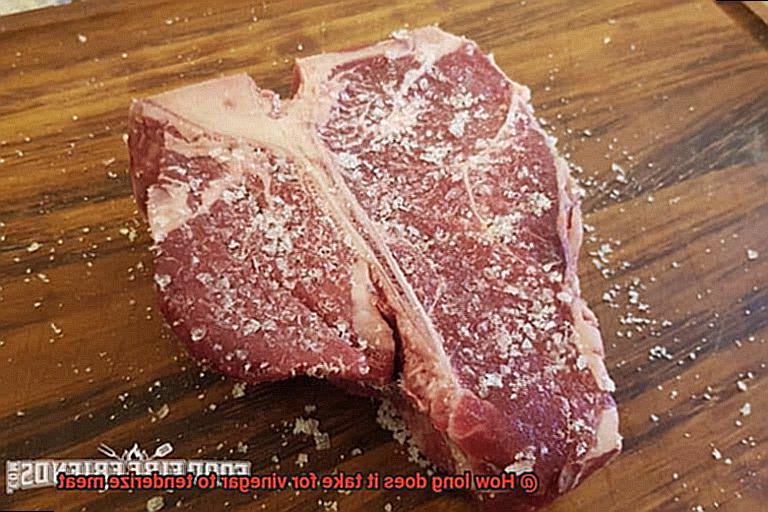
Pineapple and papaya contain enzymes called bromelain and papain, respectively, which can break down protein and tenderize your meat. Puree some fresh pineapple or papaya and use it as a marinade for your meat.
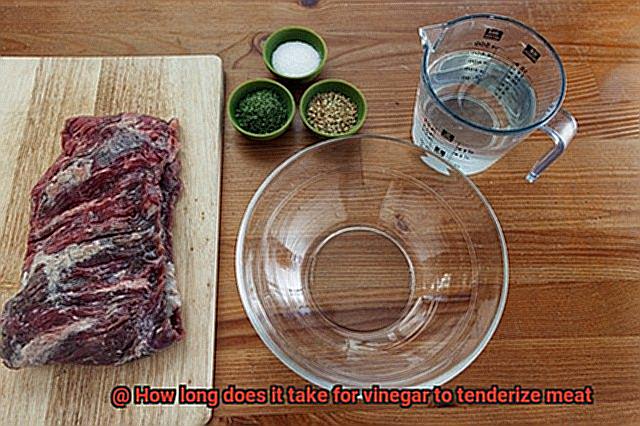
Slow-Cook Your Meat
Slow-cooking your meat at a low temperature for an extended period of time can also lead to juicy and tender results. This method allows the natural juices of the meat to break down the connective tissue over time, resulting in melt-in-your-mouth deliciousness.
Commercial Meat Tenderizers
If you’re short on time, there are commercial meat tenderizers available that use enzymes to break down the protein structure of the meat. However, it’s important to follow the instructions carefully as overusing these products can result in mushy or overly soft meat.
Common Mistakes When Using Vinegar to Tenderize Meat
Vinegar can be a great solution to tenderize meat, but there are some common mistakes that people make that can ruin your dish. As an expert in this area, I want to share with you some tips on how to avoid these mistakes and ensure that your dish turns out perfectly tender and delicious.
First off, it’s essential to use the right amount of vinegar and time for marination. While vinegar can break down the protein in meat and make it more tender, overdoing it can actually ruin the texture and make it mushy. So, be careful with the amount of vinegar you use and the length of time you leave your meat in it. Stick to a maximum of 2-3 hours before cooking.
Another mistake is using the wrong type of vinegar. While most types will work for tenderizing meat, some may have a stronger flavor that could overpower the taste of the dish. For example, balsamic vinegar has a sweet and tangy flavor that may not be suitable for all types of meat dishes. Choose the right type of vinegar that complements the flavors of your dish.
In addition, don’t rely solely on vinegar as a marinade. Combining it with other ingredients such as oil, herbs, and spices will create a flavorful marinade that will also help tenderize the meat. This will also prevent the meat from becoming too acidic and overpowering.
Lastly, don’t fall into the trap of thinking that marinating your meat in vinegar for an extended period of time will result in more tender meat. In fact, doing this can have the opposite effect and actually toughen the meat. So, avoid marinating for too long.
zmA1dIJ38IQ” >
Conclusion
In conclusion, vinegar is a versatile and effective meat tenderizer that has been used for generations by both professional chefs and home cooks. Its acetic acid content breaks down tough fibers in meat, making it more palatable and easier to chew. However, the duration of time needed for vinegar to tenderize meat varies depending on factors such as the type of meat, cut, and cooking method.
For tougher cuts like beef brisket or pork shoulder, marinating in vinegar overnight can significantly improve tenderness. Conversely, more delicate cuts such as fish may only require a quick dip in vinegar before cooking.
Apart from enhancing tenderness, using vinegar to marinate meat has numerous other benefits such as reducing cooking time, improving flavor, aiding digestion, extending shelf life and even killing harmful bacteria. Nonetheless, it’s crucial to select the appropriate type of vinegar for your dish and avoid over-marinating.
Although there are alternative methods to tenderize meat like slow-cooking or using a meat mallet, using vinegar remains a popular choice due to its versatility and effectiveness.

